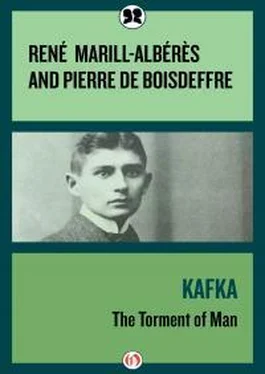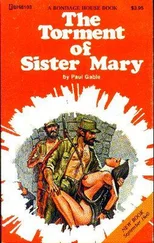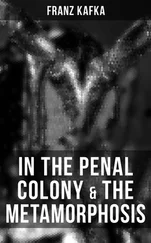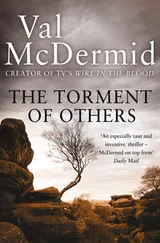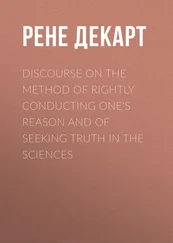Everything which seems strange in our hypothetical example also points to the strangeness of Kafka. It is by virtue of his strangeness that he has made such a profound impression on us that we no longer see in him anything except the myth to which he dedicated his work and his life.
NOTES
1. Préparatifs de noce à la campagne .
2. J. -P. Sartre, Situations , I (Paris: Gallimard, 1947).
3. Herman Uyttersprot ( Revue de Langues vivantes , No. 42, Brussels, 1953) thinks that a part of the “absurdity” of The Trial is involuntary. He attributes this to the incompleteness of the work and to the fact that Max Brod shuffled the chapters, which could be more logically arranged. This theory is ingenious but without great significance, for the “absurd” is not restricted to The Trial .
4. Notebooks , November 18, 1917.
5. Renato Poggioli, in The Kafka Problem , edited by Angel Flores (New York, 1946), p. 106.
6. Maja Goth, Franz Kafka et les lettres françaises (José Corti, 1955).
CHRONOLOGY OF IMPORTANT DATES
1883, July 3
Franz Kafka is born in Prague, in a house on the corner of Karpfengasse and Maisegasse.
German studies in the elementary school in the Masnytrh (Fleischmarkt), then the Staromestké, the best German secondary school in Prague. (One of his schoolmates is Hugo Bergmann, future rector of the University of Jerusalem; his professors are Paul Kisch and Emil Utitz.) He lives with his family at 36 Niklasstrasse (today Parizska), then on the corner of Niklasstrasse and Staromestké Namesti (Old Town Square) near his father’s place of business on the same avenue, in the Palais Kinsky.
1901
Begins his studies in law. Brief stay in Munich.
1902
Beginnings of friendship with Oscar Pollak (the future historian of Baroque art) and Max Brod. Summer in Liboch, then in Zuckmantel.
1906
Receives his doctorate in Jurisprudence (June 18, at the University of Prague). Summer in Triesch with his uncle, Dr. Siegfried Löwy.
1907
First literary works (“Description of a Struggle,” “Preparations for a Wedding in the Country,” etc.). Is mentioned by Max Brod in the Berlin weekly Die Gegenwart .
Takes a position (in October) with the Assicurazioni Generali.
1908
Leaves the Assicurazioni Generali to work half time in a semi-governmental position (Workmen’s Accident Insurance Company). Makes fair copies of his first stories.
1909
Two sections from “Description of a Struggle” published in Hyperion , Franz Blei’s journal. Vacation on the Italian lakes with Max Brod.
1910
Begins to keep his Diary .
In October, first trip to Paris with Max Brod.
1911
Many trips—to East Prussia, Switzerland, northern Italy, Paris.
1912
Begins Der Verschollene (“The Boy Who Was Never More Heard Of,” the first sketch of the work published posthumously as Amerika ); “The Judgment” and “The Metamorphosis.”
Summer at Weimar and in the Harz Mountains. On August 13, he meets F. B., “the girl from Berlin.”
1913
Betrachtung (in English, the chapter “Meditation” in The Penal Colony published by Rowohlt, followed (in May) by the first chapter of Amerika (“The Stoker”), published by Kurt Wolf.
Trips to Vienna, Venice, Riva (in September, at the Hartungen Sanatorium, a brief romance with a Swiss girl).
1914
Engagement in Berlin to F. B., followed by their first break (“I was bound like a criminal”).
Trips to northern Germany.
Beginnings of The Trial and The Penal Colony . Friendship with Franz Werfel and Dr. Weiss.
Declaration of war (Kafka, a civil servant, is not subject to the draft).
1915
Again meets F. B.
Travels in Hungary.
In October, receives the Fontane Prize for “The Stoker” (following the withdrawal of Sternheim).
1916
Changes of residence. From Kilkova and Dloudha Trida, Kafka moves to Ulicka, in Prague.
Vacation at Marienbad, with F. B.
Conference in Munich in November. Writes “A Country Doctor.”
1917
Moves to Alchymistengasse, then to the Palais Schönborn. New engagement to F. B., followed by a new break.
Tuberculosis (first attack of blood-spitting in the month of August) and sick leave.
Studies Hebrew and reads Kierkegaard. Publishes “Two Animal Stories.”
1918
Long sojourn in Zürau, then Prague. Writes “Aphorisms” and “The Bucket-Rider”; begins “The Great Wall of China.”
1919
Completes A Country Doctor , published by Kurt Wolf, and The Penal Colony . In Schelesen, writes Letter to His Father (November).
1920-1921
Vacation and treatment in Merano; affair with Milena Jesenská. Winter in a sanatorium in the Tatra Mountains. First draft of The Castle .
1922
Sojourn in Prague and on the Baltic.
1923
Meets Dora Dymant, who will never leave him, in Müritz.
In Berlin, begins “The Burrow,” “Josephine the Singer,” “Investigations of a Dog,” “A Hunger Artist.”
1924
Max Brod brings Kafka back to Prague. Dora Dymant’s father refuses to give his consent to her marriage.
Dying, Kafka goes from clinic to sanatorium: the Wiener Wald, Hajek’s clinic, then the sanatorium in Kierling, where he dies on June 3. Burial in Prague, in the Jewish cemetery of Straschnitz.
BIBLIOGRAPHY
EDITIONS OF KAFKA’S COMPLETE WORKS
Gesammelte Werke , ed. Max Brod; Briefe an Milena , ed. Willy Haas. 9 vols. Frankfort: Fischer, 1946-1958.
Gesammelte Schriften , ed. Max Brod. Berlin: Schocken, 1934 (vols. I—IV). Prague: Mercy, 1936-1937 (Vols. V, VI).
RECENT BIBLIOGRAPHIES OF KAFKA
Beebee, Maurice and Naomi Christensen. “Criticism of Franz Kafka.” Modern French Studies , VIII (1962), 80-100.
Benson, Ann Thornton. “Franz Kafka: An American Bibliography.” Bulletin of Bibliography , XXII (1958), 112-114.
Flores, Angel, “Bibliographical Index of the Works Available in English and Biography and Criticism: A Bibliography,” in Franz Kafka Today , ed. Angel Flores and Homer Swander. Madison: University of Wisconsin Press, 1958. Pp. 215-285.
Politzer, Heinz. “Bibliography,” in Franz Kafka — Parable and Paradox . Ithaca, New York: Cornell University Press, 1962. Pp. 367-371.
BOOKS IN ENGLISH
Brod, Max. Franz Kafka: A Bibliography , trans. by G. Humphreys
Roberts and Richard Winston. New York: Schocken Books Inc., 1947. 2nd ed., 1960.
Goodman, Paul. Kafka’s Prayer . New York: 1947.
Gray, Ronald, ed. Kafka: A Collection of Critical Essays . Englewood
Cliffs: Prentice-Hall, 1962.
Heller, Erich, The Disinherited Mind . London: 1952.
Janouch, Gustav, Conversations with Kafka , trans. by Goronwy
Rees. New York: Frederick A. Praeger, Inc., 1953.
Neider, C., Kafka; His Mind and Art . New York: Oxford University Press, 1949.
Politzer, Heinz. Franz Kafka — Parable and Paradox . Ithaca: Cornell University Press, 1962.
Rhein, Phillip H., The Urge to Live : A Comparative Study of Franz Kafka’s Der Prozess and Albert Camus’ L’Etranger. Chapel Hill: University of North Carolina Press, 1964.
Russell, F., Three Studies in Twentieth Century Obscurity . New York: Dufour, 1963.
Spilka, Mark, Dickens and Kafka: A Mutual Interpretation . Blooming ton: Indiana University Press, 1963.
Читать дальше
